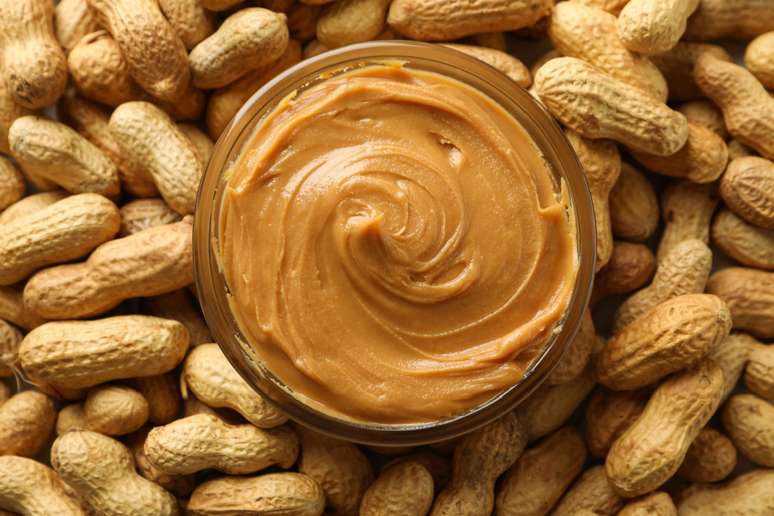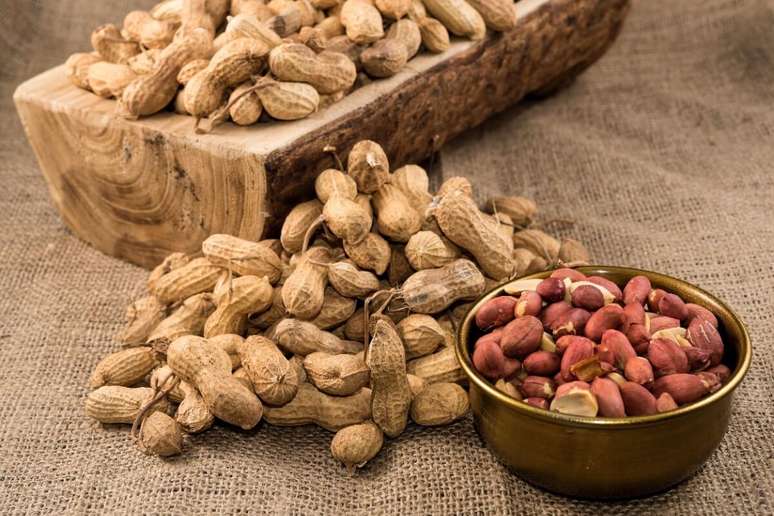Rich in protein, good fats, vitamins and minerals, it is a versatile and powerful ingredient for wellness
Peanuts are a legume native to South America, especially in the regions that today correspond to Brazil, Bolivia and Paraguay. Widely cultivated and consumed throughout the world, it stands out for its amazing flavor and high nutritional value.
Rich in protein, good fats, vitamins and minerals, it is a versatile ingredient that can be eaten raw, roasted, in sweet and savory recipes, or even as flour and vegetable milk. In addition to being an excellent source of energy, its moderate consumption promotes health.
Next, check out the 9 health benefits of peanuts!
1. Source of protein and energy
Peanuts are an excellent source of proteinsessential for building and repairing body tissues. According to the Brazilian Table of Food Composition (TBCA), from the University of São Paulo and Food Research, the roasted version provides 27.5 mg of protein per 100 g. This makes it an interesting option for vegetarians and vegans, as well as being ideal for those who practice intense physical activity and need efficient muscle recovery.
Furthermore, it is a source of energy thanks to its combination of proteins, healthy fats and carbohydrates. Eating peanuts can provide a sustained boost of energy, ideal for anyone who needs a boost during the day.
2. Rich in healthy fats
Peanuts are rich in unsaturated fats, especially mono- and polyunsaturated fats, known for their beneficial effects on cardiovascular health. These fats help reduce bad cholesterol (LDL) levels and increase good cholesterol (HDL), contributing to the prevention of heart disease.
According to data from the Ministry of Health, more than 40% of Brazilian adults suffer from it high cholesteroland the condition is considered a silent risk factor, as it rarely causes symptoms, but can cause heart attack, stroke, and other serious complications.
3. Abundant in vitamins and minerals
Peanuts are rich in essential vitamins and minerals such as vitamin E, magnesium, folic acid and copper. Vitamin E is a powerful antioxidant that fights free radicals, while magnesium plays a crucial role in muscle and nerve function.
Folate is vital for the formation of DNA and copper helps in energy production and strengthen the immune system. Other nutrients found in peanuts include phosphorus, which helps maintain strong bones and teeth, and niacin, which supports brain function and skin health.
4. Powerful antioxidants
A source of antioxidants, peanuts help fight oxidative stress, which can lead to premature aging and the development of numerous chronic diseases. Resveratrol, an antioxidant found in legumes, has been linked to better cardiovascular health and anti-inflammatory properties.
In addition to resveratrol, peanuts contain p-coumaric acid and polyphenols, which help neutralize free radicals in the body and prevent chronic diseases, contributing to a longer, healthier life.
5. Helps fight anemia
Peanuts can help fight anemia, thanks to the presence of folate (vitamin B9) in its composition. According to TBCA data, 100 g of it provides approximately 242 mcg of folate, an essential nutrient for the production of red blood cells. Deficiency of this vitamin can lead to megaloblastic anemia, characterized by an abnormal increase in blood cells.

6. It can help with weight loss
Although peanuts are high in calories, they can help you lose weight. The proteins and fibers present in foods promote satietyreducing your total calorie intake throughout the day. Plus, healthy fats boost your metabolism, helping you burn calories more efficiently.
7. Controlling blood sugar levels
Keeping blood sugar levels stable is key to preventing and managing type 2 diabetes. Peanuts have a low glycemic index, meaning they slowly release sugar into the bloodstream, preventing sudden spikes in glucose.
According to the International Diabetes Federation (IDF), more than 530 million adults are estimated to be living with the disease worldwide – and this number could reach 640 million by 2030. In Brazil, there are currently more than 13 million people living with the disease, representing 6.9% of the national population, according to the Brazil Diabetes Society.
8. Benefits for the brain
Rich in niacin and vitamin E, peanuts help protect against age-related cognitive decline. Niacin is known to improve brain function and protect against neuronal degeneration vitamin E fights oxidative stress in the brain.
Additionally, resveratrol found in peanuts has anti-inflammatory properties that can protect the brain from damage. Incorporating food into your diet can, therefore, promote brain health and maintain sharp cognitive abilities as you age.
9. Improves mood
In addition to protecting the brain from damage caused by aging, peanuts also help improve mood and reduce stress. This is because the food is rich in tryptophan, an amino acid essential for the production of serotonin, the famous “happiness hormone”, responsible for regulating sleep, appetite and cognitive functions.
According to TBCA data, peanuts also stand out for their magnesium content – approximately 170 mg per 100 g –, a mineral that helps calm the nervous system and balance the release of serotonin. This balance is crucial, since an excess of neurotransmitter can cause the opposite effect to the desired one, causing anxiety, irritation and tremors.
Source: Terra
Ben Stock is a lifestyle journalist and author at Gossipify. He writes about topics such as health, wellness, travel, food and home decor. He provides practical advice and inspiration to improve well-being, keeps readers up to date with latest lifestyle news and trends, known for his engaging writing style, in-depth analysis and unique perspectives.





![A Better Life Preview: What’s in store for Wednesday, October 22, 2025 Episode 447 [SPOILERS] A Better Life Preview: What’s in store for Wednesday, October 22, 2025 Episode 447 [SPOILERS]](https://fr.web.img5.acsta.net/img/f8/43/f843493759d61370dcef713a987b0620.jpg)
-1ji50mecs3jg9.jpg)

